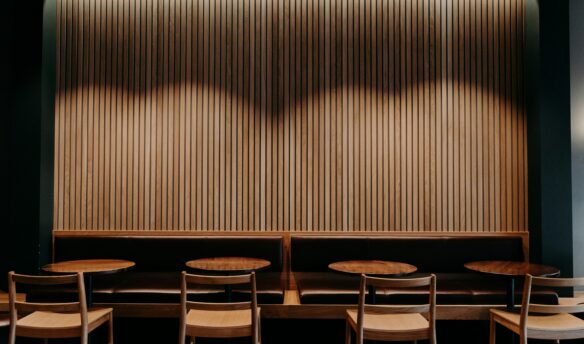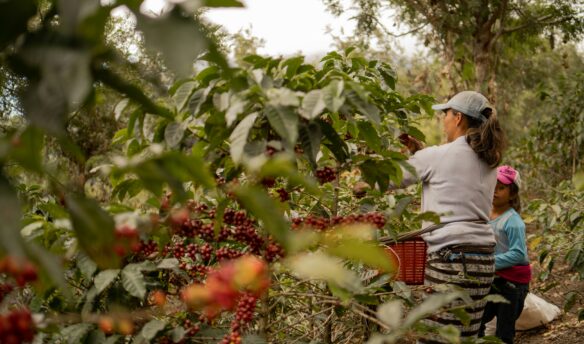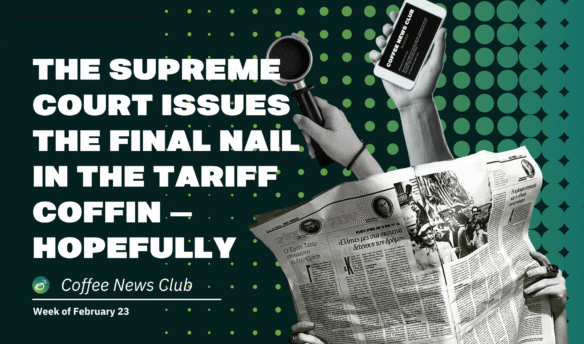Breaking: cold coffee is popular in the summer. Plus, retail coffee prices spike under Trump’s tariffs, Rainforest Alliance launches a new certification, and Starbucks stays silent with its union.
‘US Coffee Prices Surge at the Supermarket Amid Supply Crunch’ – via the Financial Times
Retail coffee prices in the United States rose 21% in August compared to the same month last year, representing the sharpest price rise since the late 1990s, according to data from the U.S. Bureau of Labor Statistics.
The increase is primarily due to the series of tariffs put in place by President Donald Trump on almost all U.S. trading partners, Susannah Savage and Gregory Meyer report for the Financial Times.
A significant factor in price hikes is the substantial tariffs placed on Brazil, the primary source of coffee for U.S. roasters. Coffee shipments from Brazil—subject to a 50% tariff—have dropped by half since the start of the year.
Because of the steep tariffs, many roasters and importers have paused buying coffee from the country. According to Thijs Geijer, a senior economist at the multinational bank ING, there are still stockpiles of Brazilian coffee in the U.S., but those will eventually run out. “There’s going to have to be additional shipments again, but the question is: where will they be coming from?” Geijer said.
One option is Colombia, where U.S. buyer interest is increasing, according to NPR. There is also hope that coffee might be exempted from tariffs, something that Commerce Secretary Howard Lutnick hinted at in early August. Late last week, the White House released a new executive order that exempted certain products that can’t be produced in the U.S., including coffee, but only if the exporting countries agree to new trade deals.
Brazil’s exports to the U.S. may have dropped, but they have surged elsewhere. In August, Germany overtook the United States to become the biggest importer of Brazilian coffee, while exports to Mexico and Colombia also increased.
Read more on the latest tariff news here.
‘Cold Coffee Ruled This Summer, New NCA Market Report Finds’ – via Daily Coffee News
Cold coffee’s popularity has skyrocketed in recent years, and the latest report from the National Coffee Association shows it is still dominating drinking trends.
The NCA releases two reports chronicling coffee trends every year: one in the spring and another in the fall. The fall edition, released on September 9, finds that, unsurprisingly, coffee is still very popular. Like the previous edition in April, the survey found that 66% of American adults drink coffee every day.
The report, which surveyed more than 1,800 adults, found that cold coffee is increasingly popular, with 32% of people drinking it in the past week, a percentage that has climbed every year for the past five years.
Other findings include:
- Specialty coffee remains popular, with 57% of adults drinking specialty coffee in the past week. Specialty is most popular with younger consumers, with 46% of 18-24-year-olds saying they had a specialty coffee drink in the past day—the highest level since 2020.
- Most people who brew at home buy their coffee from the grocery store. The majority of coffee drinkers who bought coffee out visited a drive-through—59%, an all-time high and 9% up on last year.
- Although most people still use a drip brewer when brewing at home, instant and ready-to-drink categories are both growing in popularity, increasing 6% and 9%, respectively, since 2021.
“Coffee’s staying power as a beloved touchstone in Americans’ daily lives is remarkable,” NCA CEO William “Bill” Murray commented in a press release, “and its contributions to our health and our economy give Americans even more ‘grounds for celebration’ this National Coffee Day and every day.” (National Coffee Day takes place on September 29.)
Read the full story on the latest coffee trends here.
‘Rainforest Alliance Reveals New Certification for Coffee’ – via Global Coffee Report
Unlike conventional farming, regenerative agriculture prioritizes a variety of sustainable practices, including soil health, emissions reductions, and fostering biodiversity. However, there is still no firm definition of precisely what the term entails. Last week, the Global Coffee Platform (GCP) released a new document, a framework designed to give the industry a common language as more and more people talk about regenerative agriculture practices.
Now, the Rainforest Alliance has launched a new certification specifically for regenerative agriculture.
The Regenerative Agriculture Standard is “a specialized certification solution designed to help farmers and companies build more resilient livelihoods and restore ecosystems across tropical landscapes,” according to a press release.
The organization says the new certification will be rolled out for coffee in early 2026, before expanding to other crops like cocoa, citrus, and tea later in the year. Companies and farms that already hold Rainforest Alliance certification can incorporate the new credential as an add-on, while others can pursue it as a standalone certification.
The organization doesn’t mention an exact cost for the new certification, just that it “varies depending on your role in the supply chain.” Like GCP’s document, Rainforest Alliance notes that the benefits of adopting regenerative agriculture practices include improved soil health, increased biodiversity, and climate resiliency. They also reference a recent Technoserve report that showed that regenerative agriculture practices can improve farmer income by up to 30%.
“Markets need to move beyond a ‘do no harm’ mindset to one that repairs and restores,” said Rainforest Alliance CEO Santiago Gowland. “Now is the time to transition to a new model of agriculture—one where every cup of coffee gives back more than it takes from the land and the people who care for it.”
Read more on the new certification here.
More News
‘Norwegian People’s Aid Finds Nearly 500 Unexploded Bombs in Laos Coffee Plantation’ – via ScandAsia
‘Costa Rica Coffee Growers Struggle with Exchange Rate Policy Effects’ – via Tico Times
‘Arabica Coffee Premium Jumps to 2011 High on Supply Fears’ – via Bloomberg
‘Compass Coffee Warns of Potential Bankruptcy Amid High-Stakes Rent Dispute With Ivy City Landlord’ – via Washington Business Journal
‘Vietnam Reports Record Export Revenues’ – via Global Coffee Report
The Week in Coffee Unionizing
After over a year of bargaining, talks between Starbucks and its union over a first contract have stalled. Starbucks Workers United cofounder Michelle Eisen told Marketplace’s David Brancaccio that organizers were making headway—until CEO Brian Niccol took the reins in September 2024.
Since then, Eisen says, the two sides aren’t even talking. “We have made consistent requests, invitations for Brian himself to join negotiations so that we can get this ball rolling again,” Eisen said.
“Look, we know that the company is dealing with a lot of issues,” she continued. “Failing to settle this union contract with their unionized staff is just one, but this is an easy solve. Like they could solve this tomorrow, and it would be one less thing that the company was having to deal with. It could be settled for less than a single day’s earnings.”
In a statement, Starbucks pointed to the investments it has made in staffing and improving the in-store experience “for both customers and partners.”
The company also blamed the union for the breakdown in negotiations, claiming organizers walked away from the bargaining table on multiple occasions. “Starbucks is ready to finalize a fair contract for represented partners. But we need Workers United back at the table to get it done.”
Is Coffee Good For You?
There’s both good and bad news for coffee drinkers this week: coffee may lower your chances of developing osteoporosis, but it may harm the quality of blood donations.
First, the good news: a study from China found that those who drink around two cups of coffee per day have a 60% lower risk of developing osteoporosis, compared to those who consume minimal or no coffee. Osteoporosis is a disease that weakens bones, and the risk of developing it increases as we age. Previous research on coffee and osteoporosis has been mixed, with studies finding both positive and negative connections.
For the new study, published in Scientific Reports, researchers analyzed data from nearly 3,000 participants in the U.S. National Health and Nutrition Examination Survey. They found that those with the highest daily caffeine intake—consuming more than 168 milligrams, or about two cups—saw the most potent beneficial effect. Nevertheless, even one cup was found to have a positive impact on osteoporosis risk.
Meanwhile, researchers from the University of Colorado found that drinking coffee before donating blood could lower the effectiveness of the transfusion. The study, published in the journal Haemotologica, examined data from more than 13,000 blood donors. Red blood cells, they discovered, are more prone to damage during storage, and the blood is less effective for recipients of transfusions when it contains high levels of caffeine.
“We’ve long understood caffeine’s effects on the brain and central nervous system, but this is the first large-scale study to demonstrate its impact on [red blood cell] biology,” said lead author Angelo D’Alessandro. “These findings suggest that something as common as your morning cup of coffee could have important implications for the quality of stored blood and how well it works when transfused into patients.”
While several European countries advise limiting caffeine before donating blood, the U.S. does not. Caffeine has also been shown to increase blood pressure and thus make it easier to draw blood.
Beyond the Headlines
‘So You Want to Quit Your Job and Own a Coffee Shop? Start Here’ by Julie Wolfson
‘Trump’s Tariffs Leave the Coffee Industry Facing an Uncertain New Era’ by Fionn Pooler
‘Riley Westbrook Has Strong Opinions About Espresso Machine Selection’ by Garrett Oden







